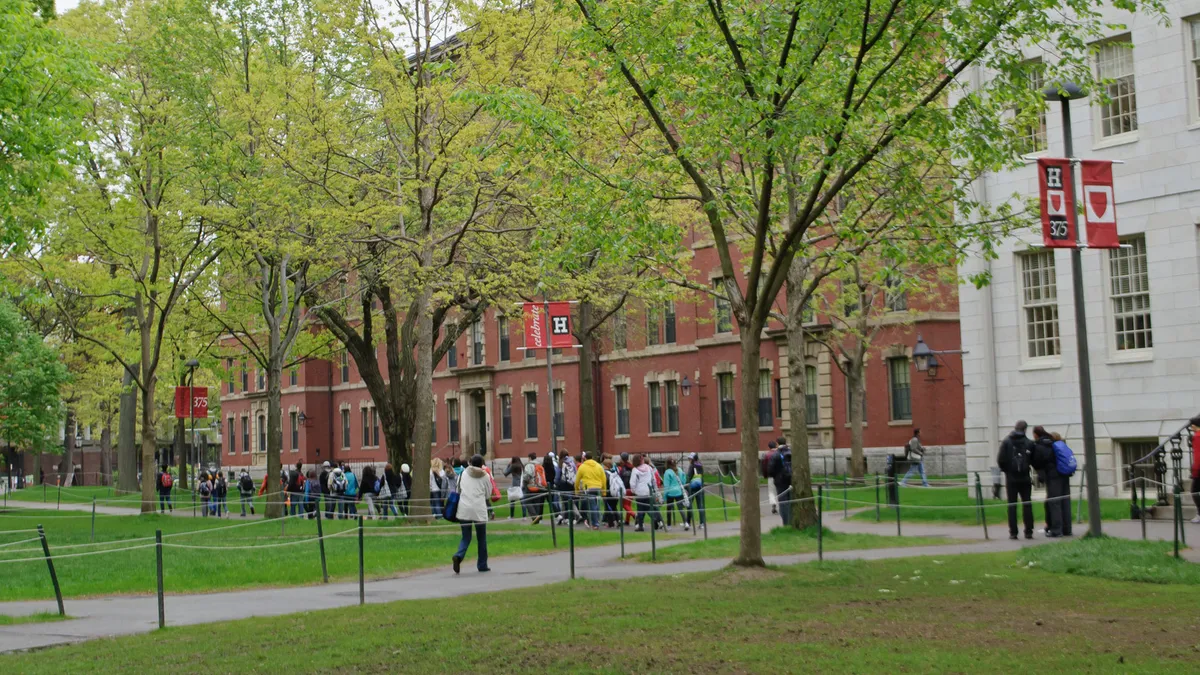Dive Brief:
- Harvard University's Wyss Institute for Biologically Inspired Engineering has received a $131 million gift, the third major donation from founder Hansjörg Wyss, the institute announced.
- Established just a decade ago, the institute counts among its achievements a number of emerging technologies, including an implant that acts as a cancer vaccine, chips that aim to replicate human organ function, a low-cost molecular diagnostic test, and a wearable "exo-suit" to help stroke and multiple sclerosis patients walk.
- Harvard President Larry Bacow said in a statement the gift will ensure the institute's continued growth and enable new collaborations.
Dive Insight:
It has been a productive first 10 years for the Wyss Institute, which has generated 2,600 patent filings, 53 licensing agreements, 29 startups and numerous industry collaborations since its creation in 2009 with a $125 million gift from the Swiss-born philanthropist.
Wyss is the founder and former chairman and CEO of orthopaedic device maker Synthes, which Johnson & Johnson acquired for $21.3 billion in 2012. The Harvard M.B.A.-holder has donated more than $400 million in total to the university.
News of the latest financial contribution, made through the Wyss Foundation, comes on the heels of a milestone for the institute in the form of an FDA 510(k) clearance for ReWalk Robotics' exo-suit. The garment-like system is worn by patients to receive gait training for recovering walking function after a stroke.
The exo-suit technology was originally developed and tested at the institute, which entered into a multi-year research collaboration with ReWalk in 2016 that could lead to additional stroke products or therapies, the company said.
Another promising technology originating with Wyss researchers is a so-called cancer vaccine consisting of an implantable biodegradable polymer scaffold that contains components from a patient's cancer cells. The system activates immune cells as they pass through the scaffold that go on to hunt and kill cancer cells elsewhere in the body. Novartis licensed the technology in 2018, and it is now being studied in patients with melanoma.
One of the first startups founded to commercialize a Wyss technology, Emulate is working on what it calls organ chips that are seeded with human cells for use in testing new drugs in development. Goals for the device include eliminating the need for animal testing in the drug development process and supporting personalized medicine.
The institute also recently licensed technology for a molecular diagnostic tool to Sherlock Biosciences that can detect DNA and RNA molecules at room temperature and without lab equipment, making the test suitable for use in diagnosing disease outbreaks in low-resource settings.
Harvard's John A. Paulson School of Engineering and Applied Sciences and the Wyss Institute colloborate to encourage interdisciplinary collaboration among scientists, biologists, physicists, chemists, engineers and clinicians. It focuses on commercialization of potential breakthrough technologies through industrial partnerships, licensing agreements and the creation of startups.
The institute employs 375 full-time staff who work in 100,000 square feet of research space shared between Harvard's Longwood Medical Campus and Cambridge locations. Wyss faculty and staff have published more than 2,000 scientific articles since 2009.
Clarification: This story has been updated to clarify Wyss' relationship with Harvard's John A. Paulson School of Engineering and Applied Sciences.










